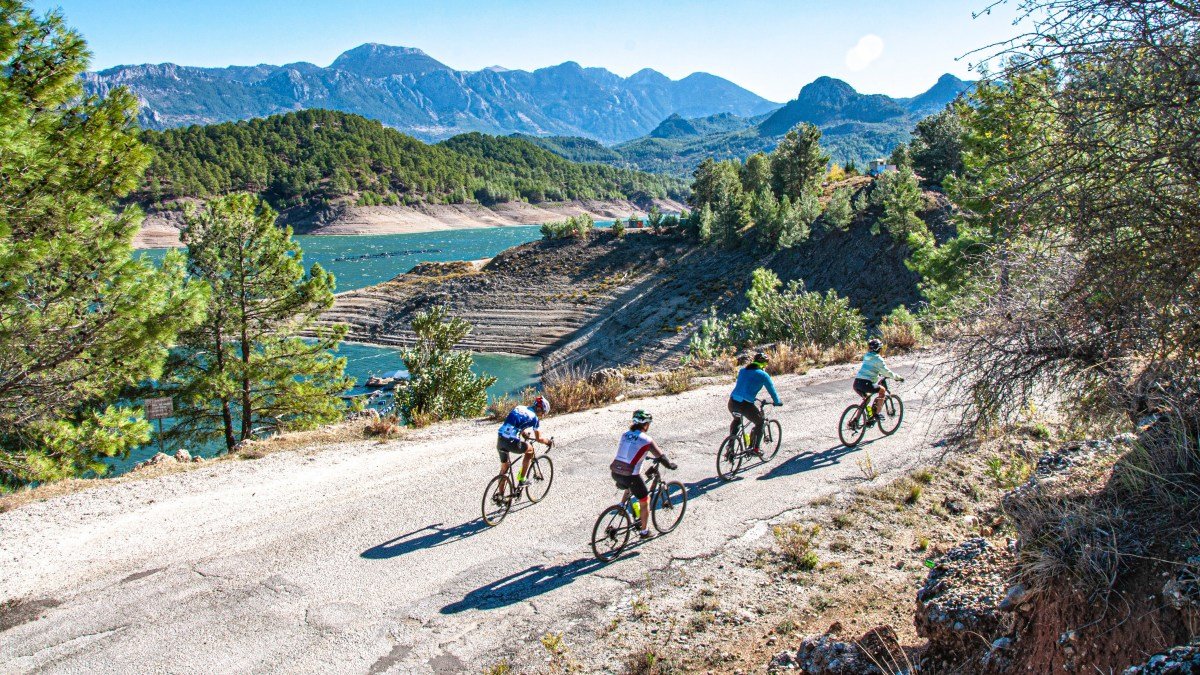The gap between those who care about the effect of their travels on the climate and those whose emissions pass them by is creating two very diverse sets of travellers. On one hand, there’s private-jet fliers — who, according to the private jet company Victor, are increasing every year. On the other, there are those determined to see the world in a slower, more considered way. One such traveller is the cricketer Oli Broom, founder of the Slow Cyclist, who journeyed from London to Brisbane by bike. When passing through Paris, he may have wished he’d had two particular books with him, to guide him around the tiny ateliers, craftspeople and historic shops of the city. Read on to find out more.
Some companies are born of their founders’ love of something. Others are born of their loathing. Oli Broom worked in the City as a chartered surveyor and hated it. So in 2008, he decided to take off to Australia the hard way — on his bike — to think, slowly, about how he really wanted to live.
The Englishman wasn’t the first in his family to set off on a great adventure; his father, as a young man, had driven overland to Cape Town. “So I’d grown up with stories of him breaking down in Ethiopia and having to wait four days for a donkey to return with some fuel and a mechanic.”

The Slow Cyclist curates tours of Romania among other places, with trips taking 4-7 days for private groups of 4-12 friends
On Oli’s own return from his 14-month, 28,000km journey — which resulted in a book, Cycling to the Ashes: A Cricketing Odyssey from London to Brisbane, which raised £75,000 for the British Neurological Research Trust and the Lord’s Taverners charity — his new career path was set. Today, the Slow Cyclist is the UK’s most respected luxury cycling company, with ethics firmly aligned with Broom’s own.
Each of the journeys, taking 4-7 days for private groups of 4-12 friends, is carefully mapped by the company to take in interesting stop-offs en route. No nights are spent at a hotel chain and all meals are made by local families and communities en route. That’s because, he says, what’s important is the interaction with locals as you go. “That way, you get to experience the kindness of strangers, the serendipity of discovering different people along the way, the genuine hospitality of those who don’t see many tourists.”
Along the way there might be picnic lunches (perhaps on a table in a river, to cool off riders’ feet), tours of historic buildings and excursions to farmers’ barns to taste cheese or wine or to have dinner. Each of the trips is in a region less travelled — that might be in a remote part of Poland, the forests of Transylvania or the Mani peninsula in Greece. Broom will also curate trips for travellers with specific interests: in 2025 he’s arranging a 10-day trip around Italy for 20 Canadians, with stop-offs at night to take in performances of opera and classical music.

It is also possible to arrange bespoke curated trips if there is a particular part of the world guests would like to see
Bags, of course, are transported by car (as are the feather pillows and fine linens); all trips are accompanied by two guides and a host; and the bikes are electric because they’re “an amazing leveller”, Broom says. “It means that you can cycle whether you’re fit or not. Those who aren’t can have it fully electric. And those who are can just cycle and enjoy the challenge.”
In addition, 1 per cent of all revenue is given to local charities in areas through which they pass. “I am not interested in lining the pockets of people who don’t have roots embedded locally,” he says. “I’m interested in opening people’s eyes to the world around, and making sure everyone benefits.”
Trips cost from £2,290 for four nights to £3,995 for seven nights, excluding flights; theslowcyclist.com
The secret antiques shops of Paris
For lovers of art and antiques Paris is always a glorious city to explore. But the author Marin Montagut makes the city even more compelling to visit for sustainable shopping. The Toulouse-born flea-market expert fell in love with the City of Lights as a ten-year-old and has subsequently spent his life exploring and documenting its traditional shops and historic streets.

Marin Montagut showcases a different type of Parisian emporium
In Timeless Paris: Ateliers, Emporiums and Savoir Faire, he takes readers on a journey around 19 of the French capital’s most characterful institutions, including a herbalist’s boutique near Place de Clichy, a collection of rare books in the Galerie Vivienne and an antiques shop in the Place de Furstemberg (which he calls “the most charming square in Paris”).

In Extraordinary Collections, Montagut celebrates the art of hoarding
And in Extraordinary Collections: French Interiors, Flea Markets and Ateliers, the lifelong brocante-lover leads us into the spaces of collectors and fellow hoarders, from vendors of antique door handles and traditional baskets to chair-sellers and hat-makers, proffering a little history of each alongside photographs and carefully collated moodboards. Between them, the books offer a rare insight into normally private spaces, and an invitation to look further than the Eiffel Tower and Champs-Élysées.
£35 each; editions.flammarion.com
A new era of private jet travel
Anyone who thought that, given our current climate crisis, private jet travel was over is wrong, according to Victor. The private jet company has not only seen an increase in spend per passenger since 2018 to £31,000 a year but its clients’ journeys are longer, averaging 2.2 hours. What has changed, it says, is the attitude of big companies towards flying privately. “There is definitely an awareness of what it looks like to do business using private jets,” says Dan Cook, the company’s director of sales, “so they will make an effort to make it look more sustainable.” How? “If they can take a jet that burns less fuel, they’ll sometimes do that,” he says. Or they’ll pay more to fly using sustainable aviation fuel (SAF). Last year, he says, the company booked 362 SAF-fuelled journeys (or 1 in 5), which emitted 80 per cent less carbon than if the jets had been powered by normal aviation fuel. Like most private jet companies, Cook admits that “there is no pretence that private jets aren’t harming the environment. But if we can help customers reduce their carbon, we will.”

A Victor D-IOVA five-seater jet
Although to further encourage its clients to book, the company has also launched a points system — the first in private aviation — rewarding clients with a point for every dollar spent. A London to Dubai flight costing $100,000, for instance, would be rewarded with 100,000 points to use in more than 1,000 hotels or 50,000 ticketed events, including F1 races. The uptake from clients as a result, Cook says, has been significant. Over the past year the company has spoken to its top 100 clients an average of 52 times a year — a big increase. “We are never going to go back to not flying,” he adds, adding that in the past year they’ve seen an 86 per cent rise in flights to Egypt and 67 per cent to Turkey. “We are now a global community.”
flyvictor.com




